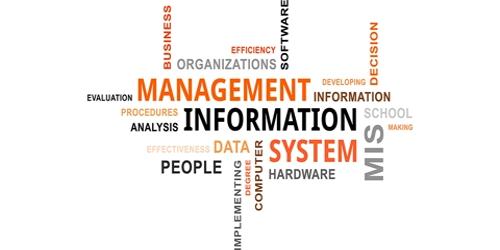
Management Information System
A Management Information System (MIS) is a computer System consisting of hardware and software that serves as the backbone of an organization's operations. An MIS gathers data from multiple online Systems, analyzes the Information, and reports data to aid in Management decision-making.
OR
A Management Information System (MIS) is an information system used for decision-making, and for the coordination, control, analysis, and visualization of information in an organization.
The study of the management information systems involves people, processes and technology in an organizational context.
OR
Management Information Systems (MIS) is the study of
people, technology, organizations, and the relationships among them. MIS
professionals help firms realize maximum benefit from investment in
personnel, equipment, and business processes. MIS is a people-oriented
field with an emphasis on service through technology.
OR
A Management Information System (MIS) is a computerized database of information organized and programmed in such a way that it produces regular reports on operations for every level of management in a company. It is usually also possible to obtain special reports from the system easily. The main purpose of the MIS is to give managers feedback about their own performance; top management can monitor the company as a whole.
Information displayed by the MIS typically shows "actual" data over against "planned" results and results from a year before; thus it measures progress against goals. The MIS receives data from company units and functions. Some of the data are collected automatically from computer-linked check-out counters; others are keyed in at periodic intervals. Routine reports are pre-programmed and run at intervals or on demand while others are obtained using built-in query languages; display functions built into the system are used by managers to check on status at desk-side computers connected to the MIS by networks.
Information system is an integrated set of components for collecting, storing and processing data and for delivering information, cards, and digital products. Business firms and Other Organizations rely on information systems to carry out and manage their operations, Interact with their customers and suppliers, and compete in the marketplace. Information system is dynamic area or field monitors changes, perhaps the most important driving force induced by the development of computers. It is a system that works and has to do with the information. The main function of information is to avoid uncertainty and the unknown circumstances creating a solid basis for qualitative decision making in the management and leadership.
Computers are being used in all areas it is especially expressed mostly in business. Those who learn to use this powerful tool to gain competitive advantage and provide information that you needed them for careers, successful business, regardless of the profit which field are oriented in finance, marketing, management or in any other field business, and for those who do not confronted with this powerful tool will be away from the future.
Information system has to do with the critical functioning of enterprises, institutes and modern businesses.
Businesses use Information System Technology to gain competitive advantage against their rivals. In fact many basic business processes are set to increase output, productivity through the use of information systems.
MIS ─ Quality of Information
Information is a vital resource for the success of any organization. Future of an organization lies in using and disseminating information wisely.
Good quality information placed in right context in right time tells us about opportunities and problems well in advance.
Good quality information:
Quality is a value that would vary according to the users and uses of the Information.
- Intrinsic: Accuracy, Objectivity, Believability, Reputation
- Contextual: Relevancy, Value-Added, Timeliness, Completeness, Amount of information
- Representational: Interpretability, Format, Coherence, Compatibility
- Accessibility: Accessibility, Access security. Various authors propose various lists of metrics for assessing the quality of information.Let us generate a list of the most essential characteristic features for information quality.
- Reliability: It should be verifiable and dependable.
- Timely: It must be current and it must reach the users well in time, so that important decisions can be made in time.
- Relevant: It should be current and valid information and it should reduce uncertainties.
- Accurate: It should be free of errors and mistakes, true,and not deceptive.
- Sufficient: It should be adequate in quantity, so that decisions can be made on its basis.
- Unambiguous: It should be expressed in clear terms. In other words,in should be comprehensive.
- Complete: It should meet all the needs in the current context.
- Unbiased: It should be impartial, free from any bias. In other words,it should have integrity.
- Explicit: It should not need any further explanation.
- Comparable: It should be of uniform collection, analysis, content, and format.
- Reproducible: It could be used by documented methods on the same data set to achieve a consistent result
MIS ─ Information Need and Objective
Information processing beyond doubt is the dominant industry of the present century.
Following factors states few common factors that reflect on the needs and objectives of the Information processing:
- Increasing impact of Information processing for organizational decision making.
- Dependency of services sector including banking, financial organization, health care, entertainment, tourism and travel, education and numerous others on information.
- Changing employment scene world over, shifting base from manual agricultural to machine-based manufacturing and other industry related jobs.
- Information revolution and the overall development scenario.
- Growth of IT industry and its strategic importance.
- Strong growth of information services fuelled by increasing competition and reduced product life cycle.
- Need for sustainable development and quality life.
- Improvement in communication and transportation brought in by use of information processing.
- Use of information processing in reduction of energy consumption, reduction in pollution and a better ecological balance in future.
- Use of information processing in land record managements, legal delivery system, educational institutions, natural resource planning, customer relation management and so on
In a nutshell:
- Information is needed to survive in the modern competitive world.
- Information is needed to create strong information systems and keep these systems up to date.
Types of Information System:
As more and more business functions have been automated, information systems have become increasingly specialised. These systems can either perform alone or can be combined to create a larger system that performs different functions for different people.
- Office Information System: It is an information system that uses hardware, software and networks to enhance workflow and facilitate communication among employees. It supports a range of business office activities such as creating and distributing graphics, documents, sending messages, scheduling and accounting. All levels of users in a management can benefit and use the OIS
- Transaction Process System: These are information system that captures and processes data generated during an organization’s day to day transactions. They are business activity such as deposit, payment, order or reservations.
- Management Information System: It is a system that generates accurate, timely and organised information so managers and other users can make decisions, solve problems, supervise activities and track progress. Because it generates reports on a daily basis, a management information system sometime is called a management reporting system.
- Decision Support Systems: Decision support systems are information designed to help users reach a decisions when a decision making situation arises. A decision support system can use data from internal or external sources. Internal sources of data might include sales, manufacturing, inventory or financial data from an organization’s database. External source of data include interest rates, population trends, cost of new house constructions. For Example, to set the yearly sales quotes a manager can use the Decision support system to provide information support for factors which would effect internally and externally.
- Executive Information Systems: These are designed to support the information needs for executive managers. Information is presented in form of charts, tables
- Expert
Systems: Expert systems is an information system that captures and
stores the knowledge of human expert and then imitates human reasoning
and decision making process for those who have less expertise.
AI (Artificial Intelligence) is part of expert systems, which taken in your past behaviour experience, sense your actions and based on logical assumptions will take appropriate actions to complete the task.
MIS ─ Implications of Information in Business
Information processing has transformed our society in numerous ways. From a business perspective, there has been a huge shift towards increasingly automated business processes and communication. Access to information and capability of information processing has helped in achieving greater efficiency in accounting and other business processes.
A complete business information system accomplishes the following functionalities:
- Collection and storage of data.
- Transform these data into business information useful for decision making.
- Provide controls to safeguard data.
- Automate and streamline reporting.
The following list summarizes the five main uses of Information by businesses and other organizations:
- Planning : At the planning stage,information is the most important ingredient in decision making. Information at planning stage includes that of business resources, assets, liabilities, plants and machineries, properties, suppliers, customers, competitors, market and market dynamics, fiscal policy changes of the Government, emerging technologies,etc.
- Recording : Business processing these days involves recording information about each transaction or event.This information is collected, stored,and updated regularly at the operational level.
- Controlling : A business need to set up an information filter, so that only filtered data is presented to the middle and top management. This ensures efficiency at the operational level and effectiveness at the tactical and strategic level.
- Measuring : A business measures its performance metrics by collecting and analyzing sales data, cost of manufacturing and profit earned.
- Decision-making : MIS is primarily concerned with managerial decision-making, theory of organizational behavior,and underlying human behavior in organizational context. Decision-making information includes the socio-economic impact of competition, globalization, democratization,and the effects of all these factors on an organizational structure.
In short, this multi-dimensional information evolves from the following logical foundations:
- Operations research and management science
- Theory of organizational behavior
- Computer science:
- Data and file structure
- Data theory design and implementation
- Computer networking
- Expert systems and artificial intelligence
- Information theory
Following factors arising as an outcome of information processing help speed up of business events and achieve greater efficiency:
- Directly and immediate linkage to the system Management Information System.
- Faster communication of an order
- Electronic transfer of funds for faster payment
- Electronically solicited pricing (helps in determining the best price)
MIS ─ Need for Information Systems
Managers make decisions. Decision-making generally takes a four-fold path:
- Understanding the need for decision or the opportunity,
- Preparing alternative course of actions,
- Evaluating all alternative course of actions,
- Deciding the right path for implementation.
MIS is an information system that provides information in the form of standardized reports and displays for the managers. MIS is a broad class of information systems designed to provide information needed for effective decision making.
Data and information created from an accounting information system and the reports generated thereon are used to provide accurate, timely and relevant information needed for effective decision making by managers.
Management information systems provide information to support management decision making, with the following goals:
- Pre-specified and preplanned reporting to managers.
- Interactive and ad-hoc support for decision making.
- Critical information for top management. MIS is of vital importance to any organization, because:
- It emphasizes on the management decision making, not only processing of data generated by business operations.
- It emphasizes on the systems framework that should be used for organizing information systems applications.
MIS ─ Major Enterprise Applications
Enterprise applications are specifically designed for the sole purpose of promoting the needs and objectives of the organizations.
Enterprise applications provide business-oriented tools supporting electronic commerce, enterprise communication and collaboration,and web-enabled business processes both within a networked enterprise and with its customers and business partners.
Services Provided by Enterprise Applications.
Some of the services provided by an enterprise application includes:
- Online shopping, billing and payment processing
- Interactive product catalogue
- Content management
- Customer relationship management
- Manufacturing and other business processes integration
- IT services managementEnterprise resource management
- Human resource management
- Business intelligence management
- Business collaboration and security
- Form automation
Basically these applications intend to model the business processes, i.e., how the entire organization works. These tools work by displaying, manipulating and storing large amounts of data and automating the business processes with these data.
Most Commonly Used Enterprise Applications Multitude of applications comes under the definition of Enterprise Applications.
In this section, let us briefly cover the following applications:
- Management information system (MIS)
- Enterprise Resource Planning (ERP)
- Customer Relationship Management (CRM)
- Decision Support System (DSS)
- Knowledge Management Systems (KMS)
- Content Management System (CMS)
- Executive Support System (ESS)
- Business Intelligence System (BIS)
- Enterprise Application Integration (EAI)
- Business Continuity Planning (BCP)
- Supply Chain Management (SCM)
MIS ─ Advantages and Disadvantages
The following are some of the advantages and disadvantages that can be attained using MIS:
ADVANTAGES :
- Improve an organization's operational efficiency, add value to existing products, engender innovation and new product development, and help managers make better decisions.
- Companies are able to identify their strengths and weaknesses due to the presence of revenue reports, employee performance records etc. Identifying these aspects can help a company improve its business processes and operations.
- Giving an overall picture of the company.
- Acting as a communication and planning tool.
- The availability of customer data and feedback can help the company to align its business processes according to the needs of its customers. The effective management of customer data can help the company to perform direct marketing and promotion activities.
- MIS can help a company gain a competitive advantage.
- MIS reports can help with decision-making as well as reduce downtime for actionable items.
DISADVANTAGES :
- Retrieval and dissemination are dependent on technology hardware and software.
- Potential for inaccurate information.
MIS ─ Professionals Make Business Better
Businesses use information systems at all levels of operation to
collect, process, and store data. Management aggregates and disseminates
this data in the form of information needed to carry out the daily
operations of business. Everyone who works in business, from someone who
pays the bills to the person who makes employment decisions, uses
information systems.
A car dealership could use a computer database to keep track of which products sell best. A retail store might use a computer-based information system to sell products over the Internet. In fact, many (if not most) businesses concentrate on the alignment of MIS with business goals to achieve competitive advantage over other businesses.
MIS professionals create information systems for data management (i.e., storing, searching, and analyzing data). In addition, they manage various information systems to meet the needs of managers, staff and customers. By working collaboratively with various members of their work group, as well as with their customers and clients, MIS professionals are able to play a key role in areas such as information security, integration, and exchange. As an MIS major, you will learn to design, implement, and use business information systems in innovative ways to increase the effectiveness and efficiency of your company.
More Than Coding
A common misconception is that MIS only concerns coding (or writing computer code). While coding concepts represent some of the fundamental principles of Information Systems Development, Implementation, and use, many jobs in MIS do not utilize coding at all. A large portion of the MIS focuses on data analysis, teamwork, leadership, project management, customer service, and underlying business theories. These aspects of the degree are what set the MIS professionals apart from a computer science specialist.
- Do you enjoy working with people?
- Would you enjoy the chance to work on global problems with people from all over the world?
- Do you enjoy analyzing and solving problems?
- Do you want to create innovative, cutting-edge technology solutions?
- Do you want to learn how to make businesses more efficient, effective and competitive?
Then you should consider as your major the field that is experiencing a critical shortage of professionally trained individuals. A field where demand is skyrocketing with projected growth rates of 38 percent – the fastest of any business discipline.
What kinds of people pursue MIS degrees?
The profiles of MIS professionals are varied, but in general, such individuals possess many of the following traits:
- Good problem solving skills
- Ability to effectively manage time and resources
- A clear vision of “the big picture” as well as the “small details”
- A desire to work closely with other people
- Excellent communication skills
- Ability to think strategically about technology
- A desire to take responsibility for developing and implementing their own ideas
What are typical career options for MIS professionals?
- IT Consultant
- Web Developer
- Information Systems Manager
- Business Intelligence Analyst
- Network Administrator
- Business Application Developer
- Systems Analyst
- Technical Support Specialist
- Business Analyst
- Systems Developer
Why should one choose to major in MIS?
- Job satisfaction
- High placement rate
- High salaries
- Exciting field
- Challenging field
- Hands-on problem solving
- Innovation and creativity
- Global opportunities
- Great chance for advancement
























